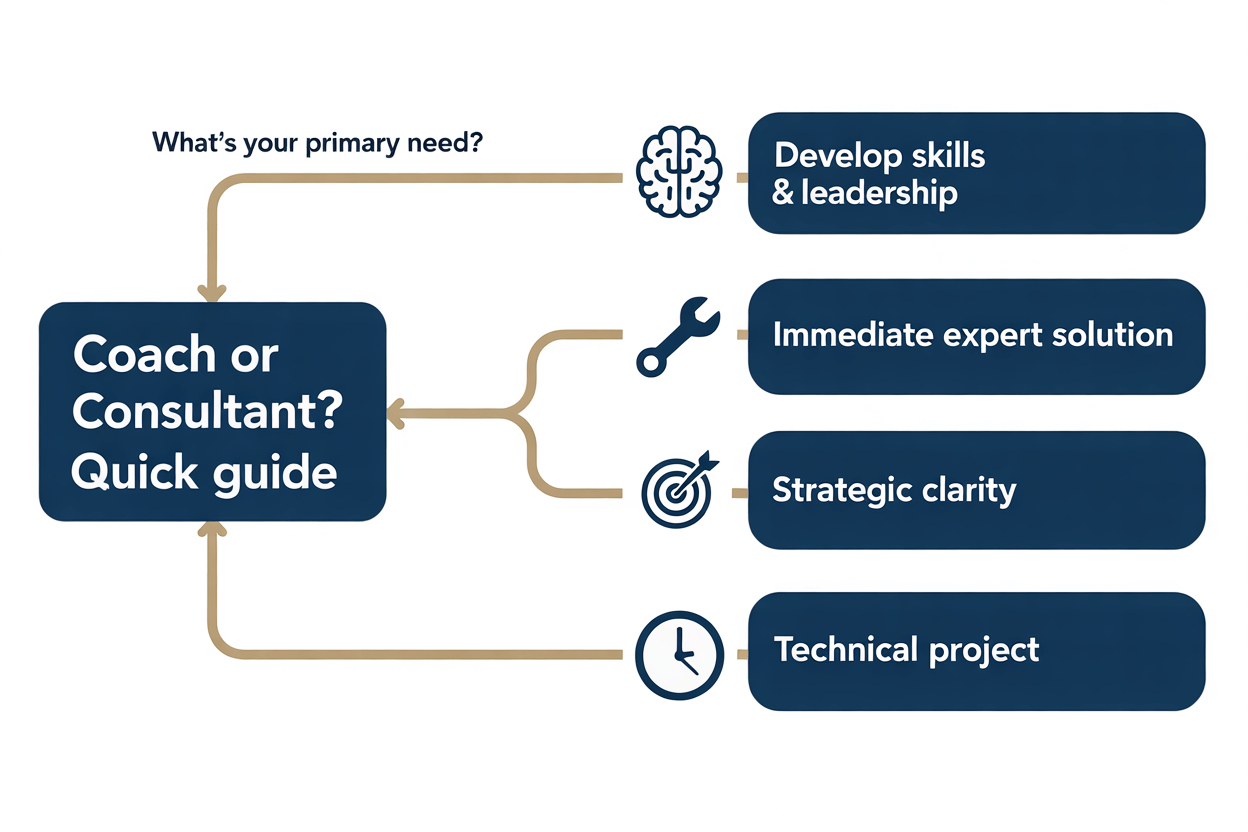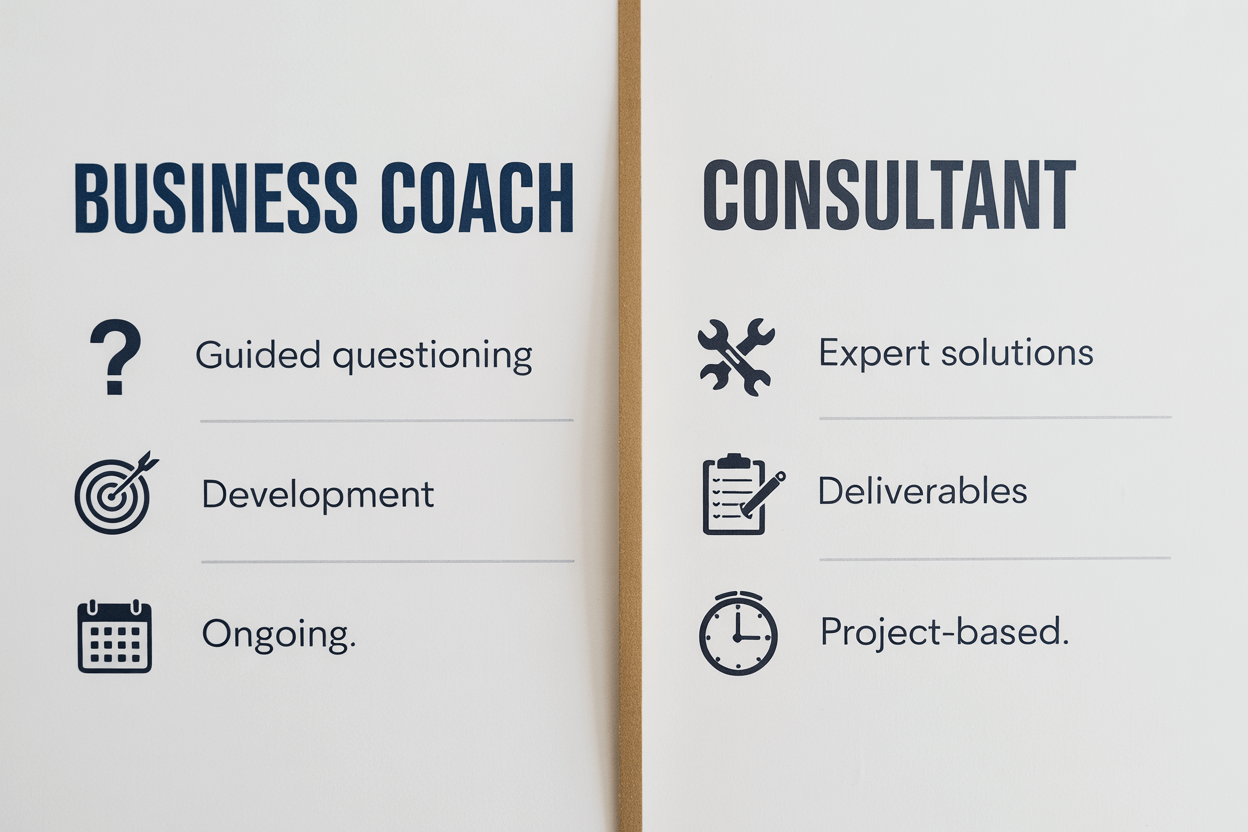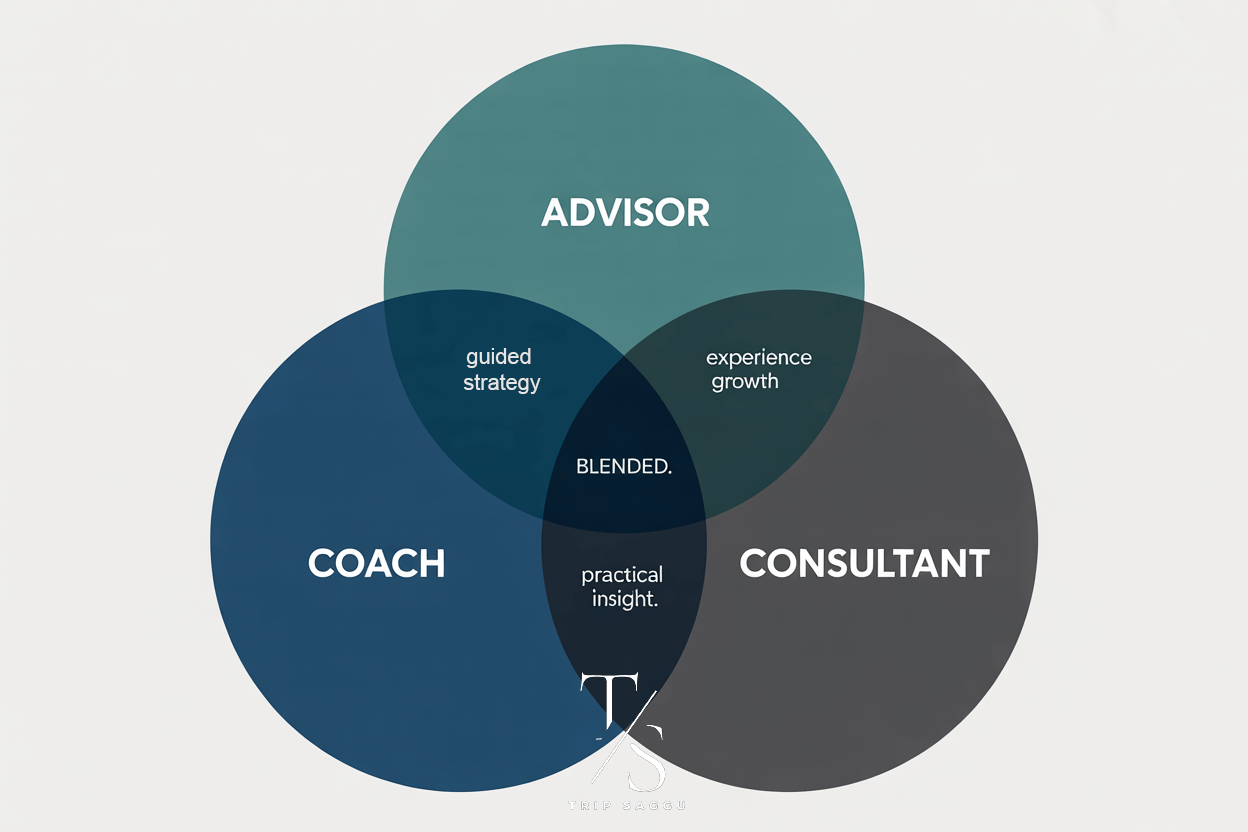Is there a difference between a business coach and a consultant? – The question I’m asked almost daily by entrepreneurs trying to decide which professional can best help their business grow.
If you’re confused about whether you need a business coach in London or a consultant, the real answer is: Both professionals can transform your business, but they take fundamentally different approaches and deliver different types of value.
Understanding these differences could save you thousands of pounds and months of frustration whilst ensuring you get exactly the support your business needs right now.
What’s the Difference Between a Business Coach and a Consultant?
The fundamental difference lies in their approach to solving your business challenges:
A business coach empowers you to find your own solutions through guided questioning, accountability, and skill development. They focus on developing you as a leader so you can tackle current and future challenges independently.
A consultant provides expert advice and solutions based on their specialised knowledge. They diagnose problems, recommend specific strategies, and often implement solutions directly.
Think of it this way: A consultant is like a mechanic who identifies what’s wrong with your car and fixes it for you. A business coach is like a driving instructor who helps you become a better driver so you can handle any road conditions confidently.
Key Philosophical Differences
| Aspect | Business Coach | Consultant |
|---|---|---|
| Primary Focus | Developing the person | Solving the problem |
| Approach | Asks powerful questions | Provides expert answers |
| Relationship | Partnership and accountability | Expert–client dynamic |
| Timeframe | Long-term development | Project-based solutions |
| Outcome | Enhanced capabilities | Implemented solutions |
Both approaches have their place, and many successful businesses use both at different stages of their growth journey.
What Exactly Does a Business Coach Do?
If you’re still unclear about what a business coach actually does, let me break down their core functions:
Strategic Development and Goal Setting
- Help you clarify your vision and long-term objectives
- Break down big goals into actionable steps
- Create accountability systems to ensure progress
- Regular reviews and strategy adjustments
Leadership and Personal Development
- Enhance your decision-making capabilities
- Improve communication and leadership skills
- Work on mindset and limiting beliefs
- Develop emotional intelligence and resilience
Problem-Solving Facilitation
- Guide you through structured problem-solving processes
- Ask challenging questions to uncover root causes
- Help you see blind spots and alternative perspectives
- Support you in developing creative solutions
Accountability and Support
- Regular check-ins on commitments and goals
- Honest feedback about progress and performance
- Emotional support during challenging periods
- Celebration of wins and learning from setbacks
The key is that coaches don’t give you the answers – they help you discover them yourself, ensuring the solutions are authentic to your leadership style and business context.

What Does a Business Consultant Do?
Business consultants take a more direct, expert-led approach:
Expert Analysis and Diagnosis
- Conduct comprehensive business audits
- Identify specific problems and inefficiencies
- Benchmark against industry standards
- Provide detailed analytical reports
Strategic Recommendations
- Develop specific strategies based on their expertise
- Create detailed implementation plans
- Provide industry best practices and proven methodologies
- Offer market insights and competitive analysis
Direct Implementation Support
- Often implement solutions themselves
- Provide specialised skills your team lacks
- Manage specific projects from start to finish
- Train your team on new systems or processes
Objective External Perspective
- Unbiased view of your business challenges
- Fresh eyes on long-standing problems
- Industry knowledge and experience from multiple clients
- Access to specialised tools and methodologies
Consultants are particularly valuable when you need specific expertise your team doesn’t possess or when you’re facing complex technical challenges requiring specialist knowledge.
What is the Difference Between a Business Coach and an Advisor?

Business advisors represent a third category that sits somewhere between coaches and consultants, and I’ll
be honest – the lines can get quite blurry here.
When I work as a business coach, I’m primarily focused on developing you as a person and a leader. I’m not there to give you all the answers, but rather to help you discover them yourself through powerful questioning and structured thinking processes. It’s about building your capability to handle not just today’s challenges, but whatever comes next.
A business advisor, on the other hand, operates more like a trusted confidant who’s been down similar roads before. They share their wisdom and experience, often in a more informal way. Think of that successful entrepreneur who mentors others – they might say, “When I faced something similar, here’s what worked for me.” It’s relationship-based guidance that draws on personal experience rather than formal coaching methodology.
Business consultants take the most direct approach. They come in as the expert, analyse your situation, and provide specific recommendations. If a coach asks, “What do you think the solution might be?” and an advisor shares, “Here’s what I learned when I was in your shoes,” a consultant states, “Based on my analysis, here’s exactly what you need to do.”
The truth is, many of us blend these approaches depending on what our clients need in the moment. Sometimes a business owner needs pure coaching to develop their thinking. Other times, they need an advisor’s wisdom from experience. And occasionally, they need a consultant’s expert solution to a technical problem.
What Differentiates a Coach From a Consultant?
Let me share a story that illustrates the fundamental difference between coaching and consulting approaches.
Last year, I worked with two different business owners facing remarkably similar challenges – both had successful companies that had plateaued around the £2 million revenue mark. But they needed completely different types of support.
The Coaching Approach in Action
Sarah, a tech startup founder, came to me feeling stuck but couldn’t articulate exactly why. In our first session, instead of diagnosing her problem, I asked her: “When you think about your business right now, what’s the biggest frustration you’re experiencing?” Through our conversation, she realised she’d become the bottleneck in every decision.
Rather than telling her to delegate (which consultants often recommend), I continued asking questions: “What would happen if you weren’t involved in every decision? What’s making it difficult for you to step back?” Over several sessions, Sarah discovered her own solutions and, more importantly, developed the confidence to implement them. The result? She learned to delegate effectively, and her company broke through to £3.5 million within 18 months.
The Consulting Approach in Practice
James, who owned a manufacturing business, had a different need entirely. He knew exactly what his problem was – his production processes were inefficient compared to competitors, but he lacked the technical expertise to fix it. He didn’t need to develop his thinking; he needed specific, expert solutions.
A consultant came in, conducted a thorough analysis, benchmarked against industry standards, and provided detailed recommendations for process improvements. Within six months, James had implemented the consultant’s systems and increased his profit margins by 30%.
Here’s the crucial difference: Sarah needed to develop her own capabilities as a leader, whilst James needed immediate access to specialised knowledge he didn’t possess. Both got exactly what they needed, but through completely different approaches.
How Time Investment Really Works
The relationship with a business coach unfolds like a good friendship – it takes time to build trust, understand each other, and create lasting change. When I start working with someone, the first few sessions are about understanding not just their business challenges, but how they think, what drives them, and what holds them back.
I remember working with Emma, a retail business owner who initially wanted quick fixes for her team management issues. But real coaching doesn’t work that way. Over our six-month relationship, we discovered that her management challenges stemmed from deeper issues around confidence and delegation. The transformation was remarkable, but it happened gradually as she developed new ways of thinking and leading.
Consulting relationships
feel more like hiring a specialist for a specific job. When a client needs help with digital marketing strategy, they might engage a consultant for three months to audit their current approach, develop a new strategy, and train their team. Once that’s done, the consultant’s job is complete. They’ve delivered their expertise, implemented their recommendations, and moved on to the next client.
What You Actually Develop Through Each Approach
Through coaching, you’re building muscles you’ll use for years to come. I often tell my clients that our goal is to make me redundant – to develop their strategic thinking, leadership capabilities, and decision-making skills to the point where they can handle whatever challenges arise.
Take leadership development, for instance. Rather than telling someone how to motivate their team, I’ll ask questions that help them understand their own leadership style and discover what works authentically for them. They learn to read their team’s needs, adapt their communication style, and build genuine connections that drive performance.
Through consulting, you’re gaining access to knowledge and systems that would take years to develop internally. A financial restructuring consultant brings decades of experience helping companies optimise their financial operations. They know what works, what doesn’t, and can implement proven systems quickly.
The consultant might spend two months analysing your financial processes and implementing new systems that immediately improve cash flow and profitability. That’s incredibly valuable, but you haven’t necessarily learned how to do it yourself next time.
When Should You Choose a Business Coach?
Business coaching is most valuable when you’re experiencing these situations:
Leadership Development Needs
- First-time management or leadership responsibilities
- Need to improve team communication and motivation
- Want to develop better decision-making under pressure
- Seeking to enhance your strategic thinking capabilities
Growth and Scaling Challenges
- Business has plateaued despite your best efforts
- Early warning signs that you need external support
- Need accountability to implement growth strategies
- Want to develop systems for sustainable scaling
Personal and Professional Development
- Feeling isolated in your leadership role
- Want to improve work-life balance and reduce stress
- Need to overcome limiting beliefs or mindset blocks
- Seeking ongoing accountability and support
Strategic Clarity and Direction
- Unsure about business direction or priorities
- Need help developing and implementing a long-term vision
- Want to improve goal-setting and achievement processes
- Require an ongoing strategic thinking partnership
Coaching is particularly effective for female entrepreneurs and startup founders who need ongoing support while building their leadership capabilities.
When Should You Choose a Business Consultant?
Business consulting is most appropriate for these scenarios:
Specific Technical Expertise Needed
- Digital transformation or IT system implementation
- Financial restructuring or complex accounting issues
- Legal compliance or regulatory challenges
- Specialised marketing or sales methodology implementation
Defined Project Requirements
- Market research and competitive analysis
- Business process optimisation
- Merger and acquisition support
- Crisis management and turnaround situations
Time-Critical Situations
- Urgent problems requiring immediate expert input
- Tight deadlines for strategic initiatives
- Need for rapid implementation of proven solutions
- Crisis situations requiring specialist intervention
Lack of Internal Capabilities
- A skills gap that cannot be filled through training
- Need for objective external analysis
- Require industry-specific expertise
- Want access to proven methodologies and tools
Consultants are often essential for technical projects, compliance issues, or when you need immediate access to specialised knowledge your team doesn’t possess.
Can You Use Both a Coach and a Consultant?
Absolutely! Many successful businesses use both simultaneously or sequentially. Here’s how they can complement each other:
Sequential Approach
- Start with a consultant to solve immediate technical problems or crises
- Follow with a coach to develop your capabilities to handle similar challenges independently
- Return to consulting when new technical challenges arise outside your expertise
Simultaneous Approach
- Coach focuses on leadership development and strategic thinking
- Consultant handles specific technical projects or implementations
- Both work together to ensure solutions align with your development goals
Integrated Approach
Some professionals combine both roles, though this requires careful boundary management to ensure clarity about which hat they’re wearing in each situation.

Cost Considerations: Coach vs Consultant
Understanding the investment differences helps with decision-making:
Business Coaching Investment
- Ongoing monthly fees: £1,500 – £8,000 per month
- Longer-term commitment: 6-18 month programmes
- Total investment: £9,000 – £100,000+ for comprehensive development
- ROI timeline: Benefits compound over months and years
For detailed pricing information, see our business coach cost guide.
Business Consulting Investment
- Project-based fees: £5,000 – £100,000+ depending on scope
- Shorter engagement: Weeks to months
- Defined deliverables: Clear start and end points
- ROI timeline: Often immediate upon implementation
Value Comparison
Coaching provides:
- Long-term capability development
- Ongoing accountability and support
- Personal leadership growth
- Sustainable behaviour change
Consulting provides:
- Immediate expert solutions
- Specific technical expertise
- Proven methodologies
- Rapid problem resolution
How to Choose the Right Professional for Your Business
Follow this decision framework to make the best choice:
Step 1: Assess Your Primary Need
- Skill development: Choose coaching
- Technical expertise: Choose consulting
- Strategic clarity: Likely coaching
- Immediate crisis: Likely consulting
Step 2: Evaluate Your Timeline
- Urgent problems: Consulting may be better
- Long-term development: Coaching is ideal
- Project-based needs: Consulting fits better
- Ongoing growth: Coaching provides sustained support
Step 3: Consider Your Learning Style
- Prefer discovering solutions: Choose coaching
- Want expert recommendations: Choose consulting
- Value accountability: Coaching provides this
- Need proven methodologies: Consulting offers these
Step 4: Assess Internal Capabilities
- Strong team, need leadership development: Coaching
- Skill gaps requiring external expertise: Consulting
- Good foundations, want to optimise: Coaching
- Technical challenges beyond current capability: Consulting
Red Flags to Avoid When Choosing
| Category | Red Flags |
|---|---|
| Coach Red Flags | • Guarantees specific business results (coaching doesn’t work that way) • Provides all the answers rather than helping you find them • No relevant business experience in building companies • Focuses only on theory without practical application |
| Consultant Red Flags | • Vague deliverables or undefined project scope • No proven methodology or track record in your area • Reluctant to provide references or case studies • One-size-fits-all solutions without customisation |
Making Your Decision: Next Steps
The choice between a business coach and consultant depends entirely on your specific situation, needs, and objectives.
If you’re seeking:
- Personal development and accountability → Choose coaching
- Technical expertise and immediate solutions → Choose consulting
- Strategic thinking and leadership growth → Coaching is ideal
- Specific project implementation → Consulting fits better

Remember: This isn’t a permanent decision. Your needs will evolve as your business grows, and the right professional support should evolve with them.
Many successful entrepreneurs work with coaches for ongoing development whilst engaging consultants for specific projects. The key is understanding what you need most right now and choosing accordingly.
If you’re still unsure which approach would benefit your business most, consider starting with a consultation to discuss your specific challenges and objectives. This conversation can clarify whether coaching, consulting, or a combination would deliver the best results for your investment.
Both business coaches and consultants have valuable roles in supporting business growth. The secret is knowing which one your business needs at this particular stage of its journey.
Whether you choose coaching for long-term development or consulting for immediate expertise, the important thing is taking action to get the professional support your business deserves.




